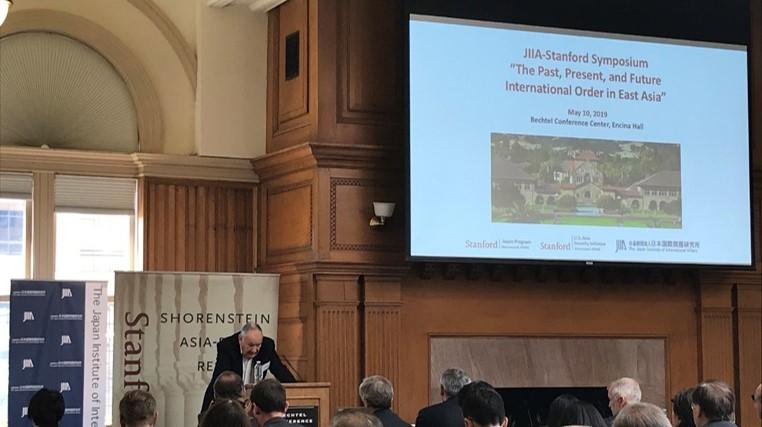The Past, Present, and Future International Order in East Asia
Stanford, CA, U.S.A
JIIA and Stanford University co-hosted a symposium titled " The Past, Present, and Future International Order in East Asia " on May 10, 2019.
JIIA-Stanford Symposium: The Past, Present, and Future International Order in East Asia
Bechtel Conference Center, Encina Hall, Stanford University
Friday 10 May 2019
Interstate relations in East Asia are at a critical juncture. The post-World War II regional order, shaped by the San Francisco Treaty of 1951, is under stress. It is unclear if this system will be maintained, and if not, what will replace it. The lineage of the San Francisco System itself reaches back to the post-World War I Versailles-Washington System. An examination of the success and shortcomings of each of these systems can offer insights on the rise and fall of international systems in an Asian context.
In this symposium co-hosted by the Japan Institute for International Affairs (JIIA) and Walter H. Shorenstein Asia Pacific Research Center (APARC) of the Freeman Spogli Institute of International Studies (FSI) at Stanford University, we explored the circumstances that shaped the establishment and evolution of the East Asian political, economic, and security architectures from post-WWI to present; discussed the forces that built and undermined the past and existing architecture; and debated possible regional futures.
Panel 1: Comparing "the Versailles-Washington System" and "San Francisco System": Lessons from the Rise and Fall of International Orders in East Asia
During this session, panelists identified the factors that led to the establishment of "the Versailles-Washington System" and "San Francisco System", their characteristics, their sources of stability and instability, and relevant lessons for policymakers today.
Panel 2: Japanese, U.S. and Chinese Interests and Security Strategies
During this session, panelists discussed the national security objectives of Japan, US, and PRC, and these three states' respective strategies for achieving these objectives. Panelists also addressed how bilateral and trilateral relations among these three states impact peace and stability in East Asia.
Panel 3: Alternative Future East Asia Systems
During this session, panelists discussed possible alternative future "East Asia Systems" focusing on how interrelationships between Japan, US, and PRC might influence the establishment and stability of different models. Participants also refered to the lessons of "the Versailles-Washington System" and "San Francisco System" if relevant.
<Program>
JIIA-Stanford Symposium:
"The Past, Present, and Future International Order in East Asia"
Shorenstein Asia Pacific Research Center (APARC), Stanford University
&
Japan Institute of International Affairs (JIIA)
Friday, May 10, 2019

9:15 am-9:30 am - Welcome Remarks
|
Gi-Wook Shin, Director, APARC, Stanford University |
9:45 am-11:30 am - Panel 1: Comparing "the Versailles-Washington System" and "San Francisco System": Lessons from the Rise and Fall of International Orders in East Asia
|
Chair: |
Daniel Sneider, FSI, Stanford University |
|
Panelists: |
Shin Kawashima, University of Tokyo |
|
Rapporteur: |
Thomas Wilkins, Senior Visiting Fellow, JIIA |
1:15 pm-3:00 pm - Panel 2: Japanese, U.S. and Chinese Interests and Security Strategies
|
Chair: |
Kenichiro Sasae, President, JIIA |
|
Panelists: |
Ken Jimbo, Keio University |
|
Rapporteur: |
Jonathan Berkshire Miller, Senior Visiting Fellow, JIIA |
3:30pm-5:15pm - Panel 3: Alternative Future East Asia Systems
|
Chair: |
Phillip Lipscy, APARC, Stanford University |
|
Panelists: |
Jim Fearon, FSI, Stanford University |
|
Rapporteur: |
Thomas Wilkins, Senior Visiting Fellow, JIIA |
5:15 pm-5:35 pm - Rapporteurs' review of symposium discussions
5:35 pm-5:45 pm - Closing Remarks
|
Karl Eikenberry, US-Asia Security Initiative, APARC, Stanford University |
